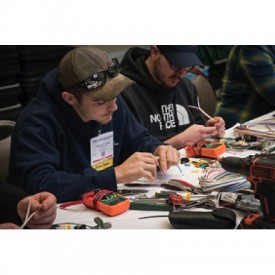RVIA Details Initiatives to Change Tech Certification

Last October, the RV Industry Association’s board of directors passed a motion for developing a strategic plan to “increase technical training,” certification, and recruitment for RV techs. RVIA then held a focus group comprised of OEMs and suppliers who helped shape a mission statement for this new initiative: “Improve the consumer experience by providing as many RV technicians as quickly as possible with the knowledge, skills and abilities to diagnose and ‘fix-it-right the first time,’ reducing repair event cycle time.”
Matt Wald, RVIA’s VP of strategic initiatives, has the mission statement memorized, having repeated, he said, about 2,000 times. After all, this initiative now accounts for 80 percent of his work day.
“That is our North Star – our guiding principle – and what we’ve been working toward,” said Wald. “And, to be blunt about it, any excuse as to why that can’t happen, I have been instructed that is noise and noise can be ignored. We’re focused on achieving that goal.”
The motto’s words are important because a lot of the industry’s future hangs on the shoulders of certified techs.
“Our consumer expectations are accelerating at a rapid pace,” said Debbie Brunoforte, president of Littler Dealer Littler Prices RV, “so I always feel like we’re playing catch-up.” How other dealerships continue on without certified techs is beyond her. “It’s such a priority for our company, and yet we still have upset customers. I know we would have far more if our people were less educated.”
RVIA hopes to double the amount of base level and trained techs, of which there’s about 1,250. It’s a process that may take up to five years realistically and will have about seven channels providing hands-on training.
Being certified can lead to impressive dealership profits, said Brunoforte. She said that certified techs on average complete tasks 20 percent faster than uncertified techs. Over an eight-hour day, they can complete 10 hours of work.
Brunoforte has been requiring techs to get certified for more than 10 years. “Now we have a class going on once a week, and it’s for an hour a day,” she said. “It’s a great way to get people either registered or certified.”
RVIA’s plan, which will be presented to members during Committee Week in June, comes at a pressing time. Wald said he wishes the presentation were earlier. The need for more certified techs trained under a centralized program is overdue. The industry shipped more than 504,000 units last year – units that will have inevitable wear and tear.
“This has risen from a level of importance to a level of crisis,” said Wald. “With record sales three years down the road, there is going to be record repair needed. And that’s just a matter of math. That’s nothing to do with the quality of the units or consumer demographics – it’s just straight math.”
While many dealerships are increasing the number of service bays, said Wald, it may not be enough to handle the repair capacity – an issue RVIA is already seeing.
The process to become certified can feel muddled, said Wald, with techs and dealers needing to work with RVIA and the RV Dealers Association for various things. He also mentioned how the message of being an RV tech can be better focused as “there’s no defined career journey” as of yet.
“I can’t just go to someone out of high school or discharged out of the military and say, ‘Look, you want a decent paying job?’ ” said Wald. “ ‘Here’s what you need to do: Take this class, that training … do this and you can be hired at an RV dealership or independent service center anywhere in the country, and make a middle- or upper-middle class living.’ ”
For RVIA, formulating a consolidated approach is worth the seven-figure price it will cost to implement. The initiative would be known as the RVIA Accredited Training Program.
Rather than have techs read textbooks, the new proposal by Wald’s team for certifying involves three steps: training (explain how to fix something), practical (show them), and application (have them demonstrate it themselves).
“The last part replaces test-taking,” said Wald. Reading and learning a manual is one thing. Proving the knowledge in the field is another. “I’ve heard stories from dealers about Master Certified techs who couldn’t turn a wrench.”
Combining the issues of inadequate techs and antiquated campgrounds, Wald said, has led to difficulty retaining RVers. Household RV ownership has consistently remained around 8 to 9 million for the past 10 years. Wald said that doesn’t add up with the amount that’s being shipped.
“What’s happening is, we get all these great new consumers through the front door,” he said, “and lose them in the back door.”
The service aspect, Wald said, can turn people off to RVing.
Another aspect of the initiative is having techs register in a database as would an aviation repairperson. The searchable database will let employers know what each tech specializes in and the assessments utilized. Incentivizing the right training can make dealers more profitable, said Wald.
The biggest resistance RVIA has encountered is that dealers may poach techs from each other.
“My answer to that is: If you provide a stable and happy workplace, and you’re fairly compensating your tech, you shouldn’t have to worry about them going somewhere else,” said Wald. “And if you’re not, then you’re part of the problem.”
“You want to acknowledge and appreciate the certified technicians. Encourage new ones to become certified. And keep them in the industry,” said Brunoforte.
Wald is currently leading the strategic effort, pulling in suggestions and ideas from OEMs, suppliers and dealers to tailor the platform best for everyone involved.


